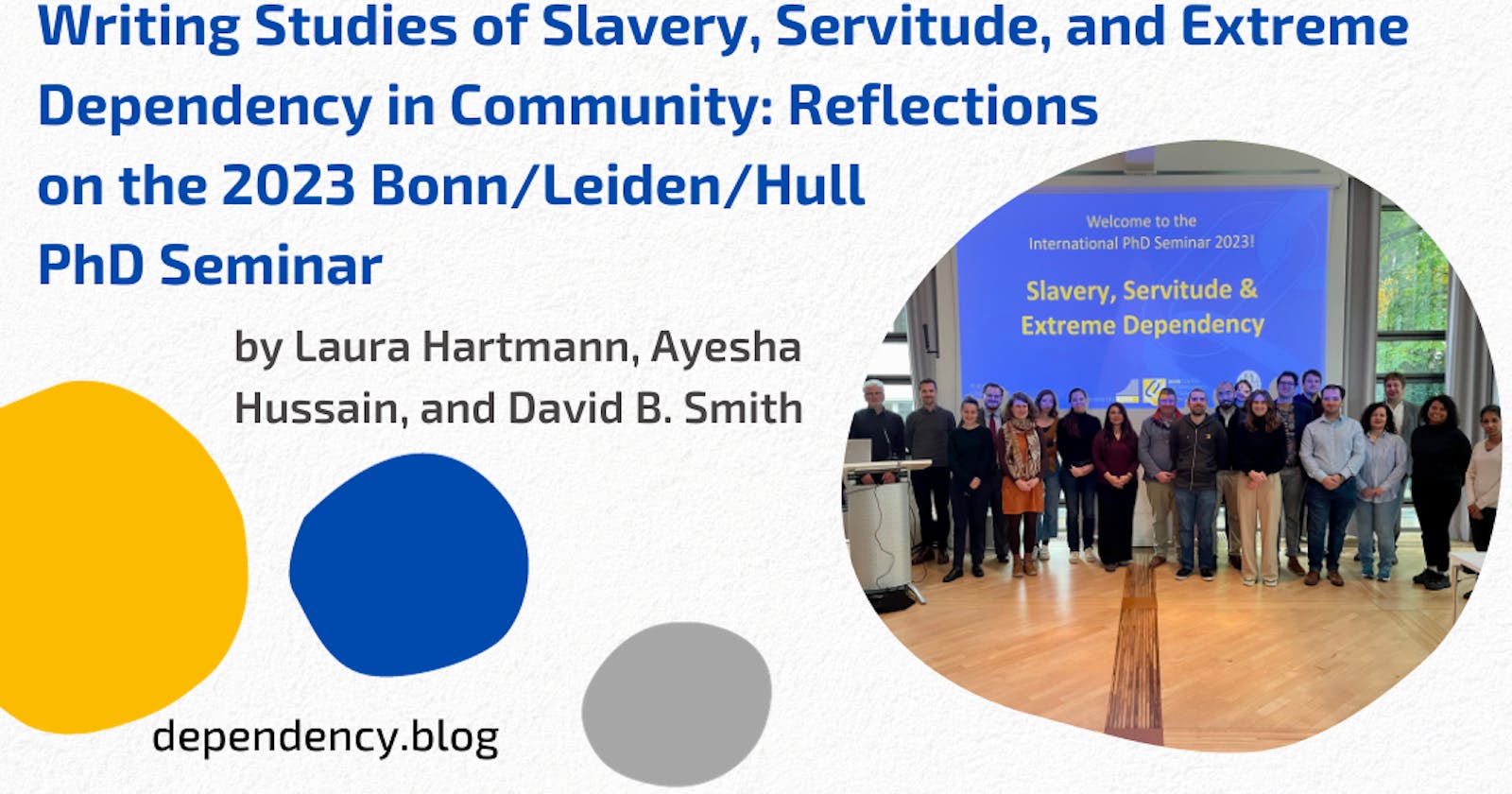Writing Studies of Slavery, Servitude, and Extreme Dependency in Community: Reflections on the 2023 Bonn/Leiden/Hull PhD Seminar
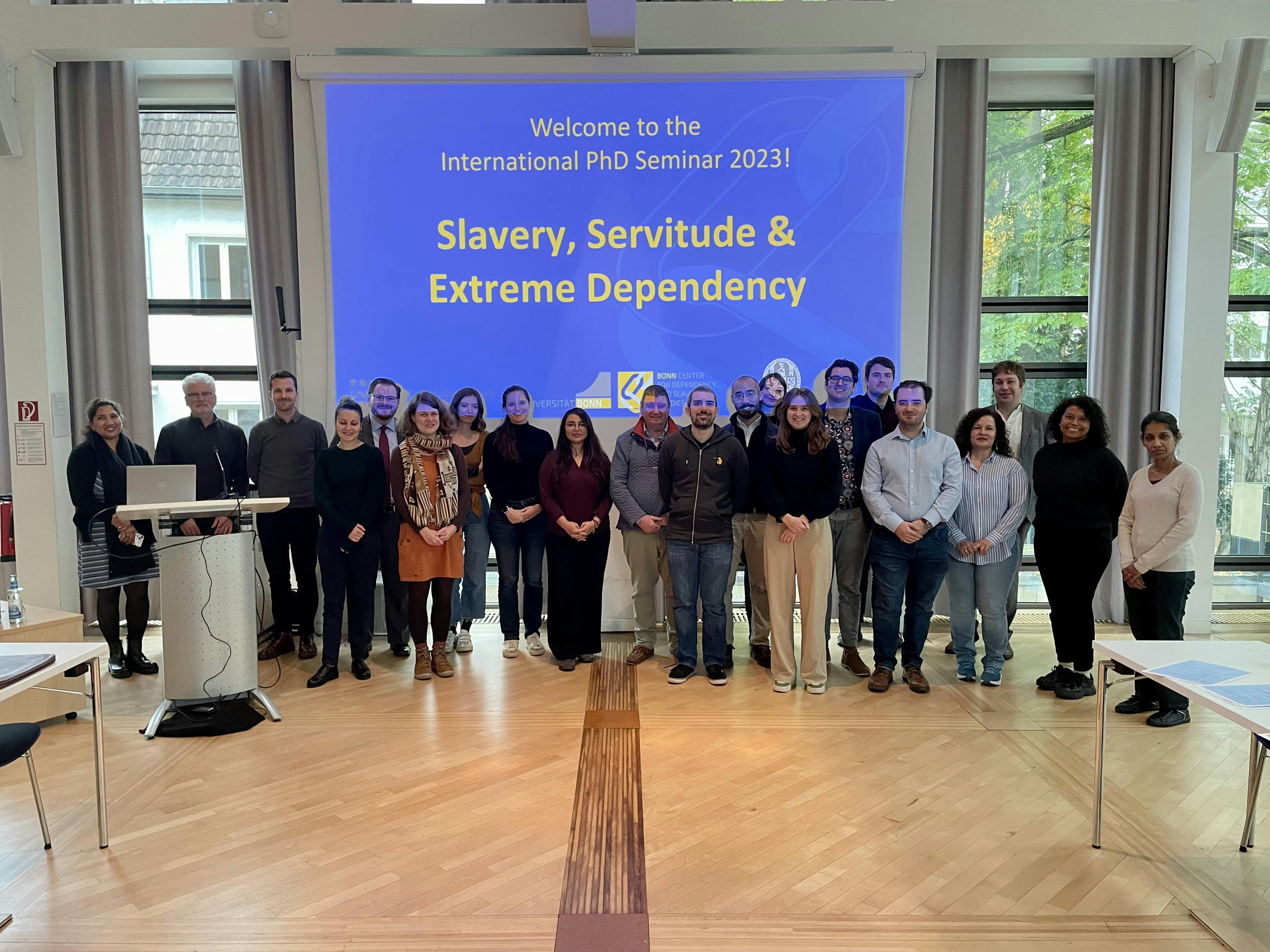
Participants in the 2023 International PhD Seminar on Slavery, Servitude & Extreme Dependency, AKA the ‘Bonn/Leiden/Hull Seminar’ (photo by BCDSS)
From 29 to 31 October 2023, the Bonn Center for Dependency and Slavery Studies (BCDSS) hosted this year’s International PhD Seminar on Slavery, Servitude, and Extreme Dependency.
This annual gathering of doctoral researchers, early postdoctoral researchers and institutional leaders is part of a close cooperation between the BCDSS, the Leiden Slavery Studies Association (LSSA) at Leiden University (NL), and the Wilberforce Institute for the Study of Slavery and Emancipation at the University of Hull (UK).
The seminar, which is aimed specifically at doctoral and junior postdoctoral researchers, allows participants to present and discuss their projects in a ‘safe space.’ The feedback these emerging scholars receive from both peers and renowned leaders in the field of Dependency and Slavery Studies helps them develop and advance their work.
Indeed, the discussions that evolved in the sessions following the presentations were inspiring and thought-provoking, not only for the early-career researchers but also for the ‘old-stagers’ – as those with lots of expertise referred to themselves.
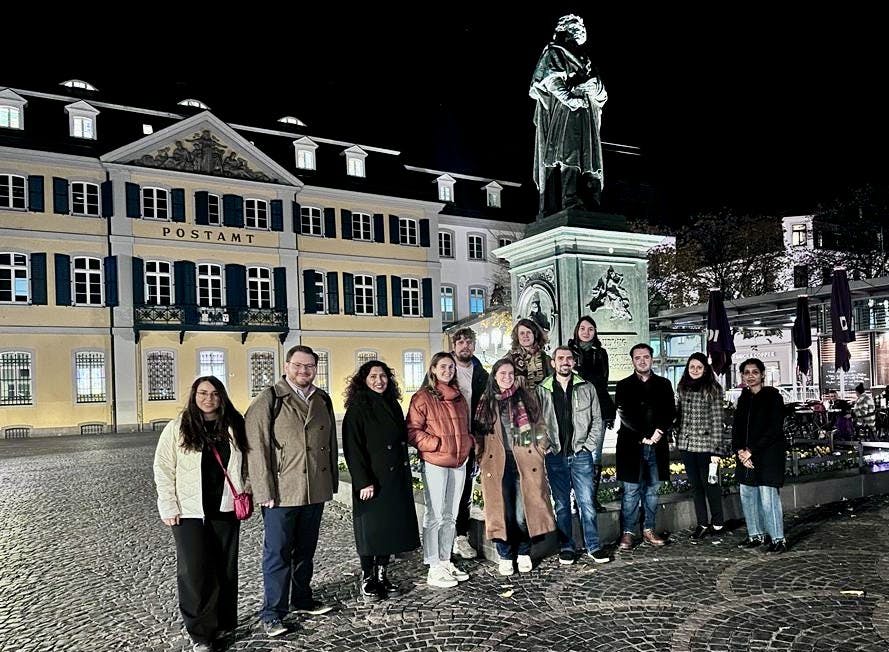
A Stop by the Beethoven Statue on Münsterplatz Bonn During the Walking Tour of the City (photo by Amalia Levi)
While the event was an academic tour de force, it was also much more.
The Bonn/Leiden/Hull seminar is not exclusively about academic talks, discussions, and feedback. In fact, for the doctoral and junior postdoctoral researchers who are accepted, the opportunity to build a professional network among fellow emerging scholars is just as important.
That is why our team worked so hard to make sure that informal opportunities for conviviality and networking were built into the program from start to finish.
On Sunday afternoon, after most of the participants from Leiden, Hull, and elsewhere had arrived, the team welcomed our international guests with a walking tour around Bonn’s city center.
The walking tour took participants through thousands of years of Bonn’s history and provided the group with multiple opportunities to reflect on the dependencies implied by or enshrined within the sites we visited.
After setting out from the university’s main building and former electoral palace of the Prince-Electors of Cologne, participants sojourned to the Alter Zoll, a fortification that was erected as a toll station along the Rhine in 1644.
From atop the foundations of the old fortress, we looked out over the political history of the ‘Bonner Republic.’ We turned toward the grounds of the Villa Hammerschmidt (Bonn residence of the President of the Federal Republic of Germany), Palais Schaumburg (residence of the Chancellor), and across the Rhine to the Siebengebirge mountain range. In the distance, we saw the hotel Petersberg, the official seat of the post-WWII Allied High Commission for Occupied Germany (HICOG) from 1949 to 1952 and an official guesthouse of the Federal Republic of Germany until today.
After pausing to breathe in the cool air from the bustling river below, we moved on to the Collegium Albertinum, a theological college of the Archdiocese of Cologne. Roman Catholic ‘Diözesantheologen’ live and share their spiritual life at the college while studying at the University of Bonn’s Faculty of Catholic Theology.
Once at the Albertinum, we descended a humble staircase that led beneath the building (or rather, beneath its parking lot) and into the remnants of an ancient Roman thermal bath. There, we discussed the roles that dependents likely played in tending to the baths and the people who used them.
Emerging from the musky depths, we made our way back to the university’s main building but stopped to look out over the Hofgarten. The large yard, which is flanked by walking paths and rows of trees, is the center of student life at the University of Bonn and the site of famous anti-nuclear political protests in 1983. There, we also stood before the Protestant Church of the Cross (Kreuzkirche). We learned about some famous preachers who had stepped into its pulpit and its service as a place of refuge during the Allied bombings of Bonn in WWII.
We then found ourselves underground once again as we examined the remnants of an 18th-century city wall beneath the university’s new subterranean parking deck. As darkness loomed, we paused to look out over Poppelsdorfer Allee, where we were met with the façade of the Poppelsdorfer Schloss, the University of Bonn’s second palace. Built over the ruins of an earlier fortification, the structure was erected by Clemens August of Bavaria, Archbishop Elector of Cologne from 1723 to 1761, as one of his ‘Lustschlösser’ (pleasure palaces).
Next, we made our way over to the Münsterplatz, where we visited the statue of Beethoven and discussed the Bonner Münster (the main Roman Catholic Church of the city), where Christians are said to have gathered for 1,350 years, as a window into the complex religious history of the city. Then, we trekked to the Beethoven House, the birthplace of the great composer.
Tired from our journey, we concluded the evening with a welcome dinner at Cafe Giaccomo.
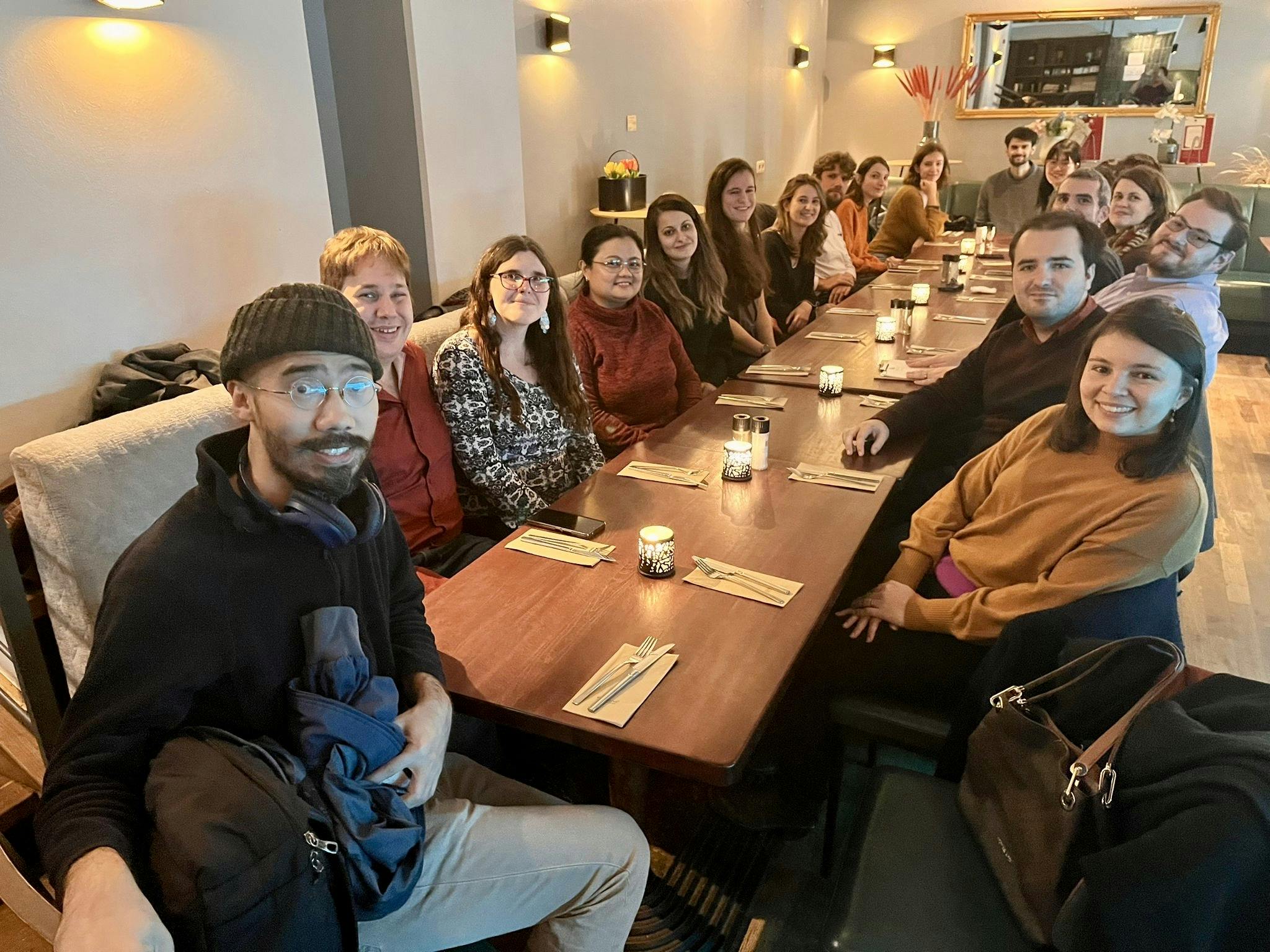
Welcome Dinner Hosted by the 2023 BCDSS Doctoral Representatives, David Brandon Smith and Ayesha Hussain (photo by Ayesha Hussain)
We got down to business on the morning of Monday, 30 October.
Prof. Dr. Stephan Conermann (BCDSS Speaker), Prof. Dr. Damian Pargas (Head of the LSSA), and Prof. Dr. Trevor Burnard (Director of the Wilberforce Institute at the University of Hull) set the stage with words of welcome. Then, Lukas Wissel (BCDSS) and John Latham-Sprinkle (University of Ghent) kicked off the opening panel. Their papers, titled “Conceptions of Asymmetrical Dependencies Amongst Actors in the Contact Zone of the Lower Guinea Cost, Approximately 1680-1740” and “The Late Medieval Caucasian Slave Trade and the Genesis of the African Slave Trade in the Atlantic,” respectively, foreshadowed future talks in their diversity of scope, context, and focus.
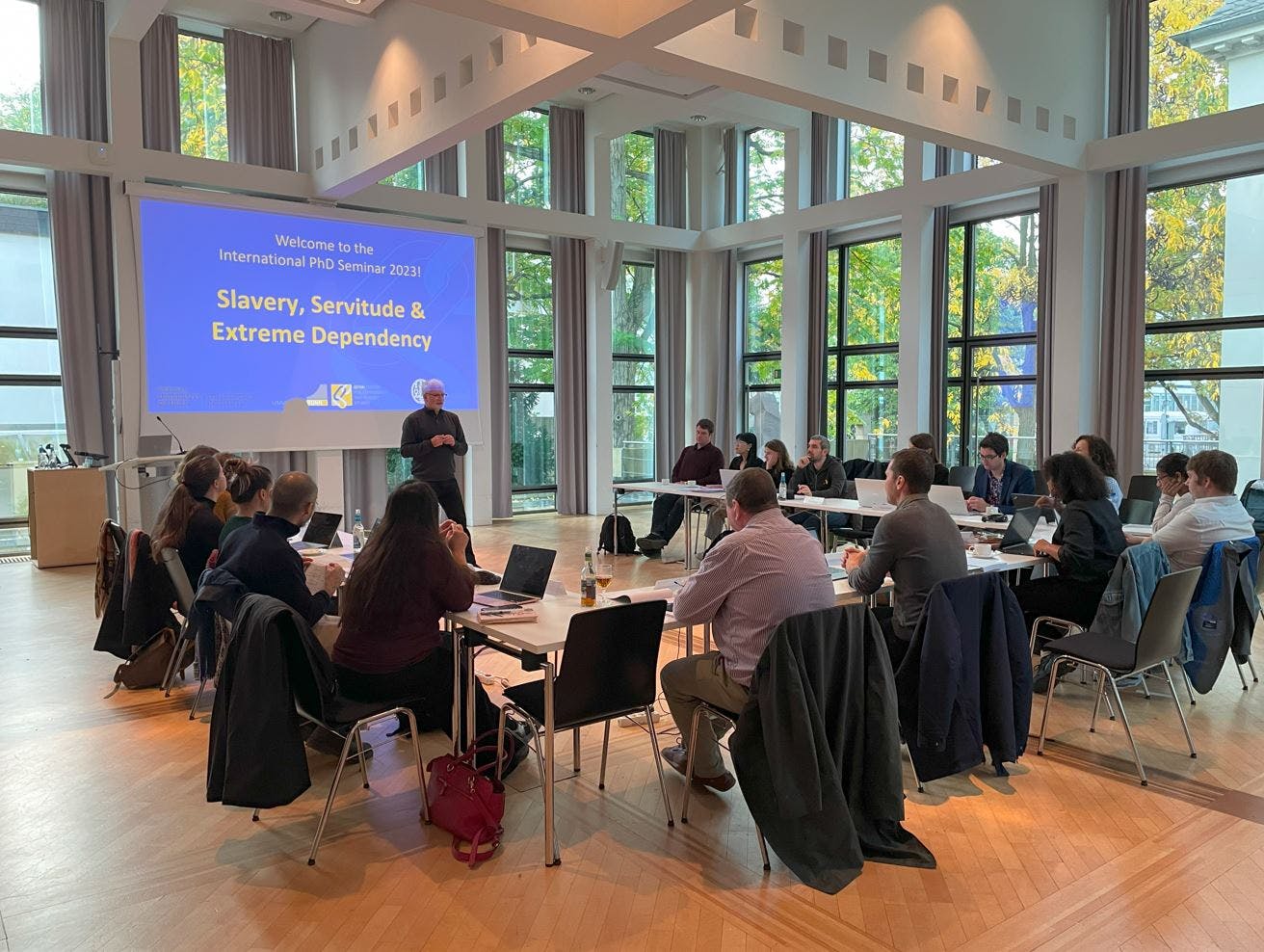
Prof. Dr. Stephan Conermann, Speaker of the BCDSS and Dean of the Faculty of Arts at the University of Bonn, addresses seminar participants (photo by David Brandon Smith)
The second panel, which Trevor Burnard chaired, featured a paper titled “‘The Sacred Rights of Every British Subject:’ Anti-Slavery, ‘Free-Labour,’ and the Transformation of Dependency in the British Empire” by Frederick (Fred) Bricknell (Hull). Amalia S. Levi (BCDSS) presented the second paper in the panel. It was titled “A Community of Enslaved People in Sephardic Households in Early Modern Bridgetown, Barbados.” While geographically diverse, these presentations shared common themes.
Her experience of the panel discussion and the rest of the event led Amalia to detect new resonances in her work. Of her experiences, she wrote,
“For me, what resonated most was that based on the diversity of the projects presented we saw in real-time the breadth of the concept of slavery from the point of view of geography (from the Black Sea to the Atlantic and Indian Ocean) and the wide spectrum of the different dependency systems beyond the dichotomy of slavery and freedom. Being in the same room and discussing these aspects together, and being able to compare to our projects was very helpful” (Amalia Levi).
In a Wilberforce Institute Blog post, Fred and Louise Salaun (Sorbonne University, Paris), who also attended the seminar, shared their thoughts.
Louise noted,
“I was impressed by the richness of the presentations whose variety of spaces and periods studied allowed me to become more aware of the wide variety of forms of dependencies. I really appreciated the diversity of sources presented in the different papers. This PhD seminar was a unique opportunity to discover different methods that can be used to reconstruct the lives and strategies of enslaved and dependent people from lacunary sources. I also found it very interesting that all the presentations, in their various aspects, question the immobility imposed on these people but also the possibilities of geographical and social mobility over one or several generations” (Louise Salaun).
Fred shared,
Several overarching themes emerged from the papers presented at the seminar, foremost among them the usefulness of strong or extreme asymmetrical dependency as an analytical concept for understanding the myriad ways in which human societies have created conditions of bondage and servitude throughout history; many of which do not at first appear to resemble what we commonly think of as ‘slavery’... Senses of identity and belonging, and especially the way that slavery and dependency are remembered and memorialised today, have also differed vastly across time and space. Overall, the seminar offered a fascinating insight into the research currently being conducted in the field, as well as an opportunity to meet and discuss key ideas and concepts with scholars from a wide range of backgrounds” (Fred Bricknell).
After lunch, Nicholas C. Sy (Radboud University–NL and Princeton University–US) kicked off the third panel, which Stephan Conermann chaired. Nicholas presented his paper titled “Enslavement in Spain’s Transpacific West: Luzon, 1620-1762.” His talk was followed by Sanayi Marcelline’s (Leiden) paper, “Racialized Identities: Community Formation and Slave Ancestry in the Creolising Suburbs of Colombo in the Mid-18th and Early 19th Century.”
As afternoon turned into evening, Damian Pargas opened Panel IV. Sophie Rose (University of Tübingen, Germany) explored the links between slavery, dependency, and adoption practices in a paper titled “Between Bonds and Bondage: Adoption, Slavery, and the Contestation of Belonging in the Eighteenth-Century Dutch East and West Indies.”
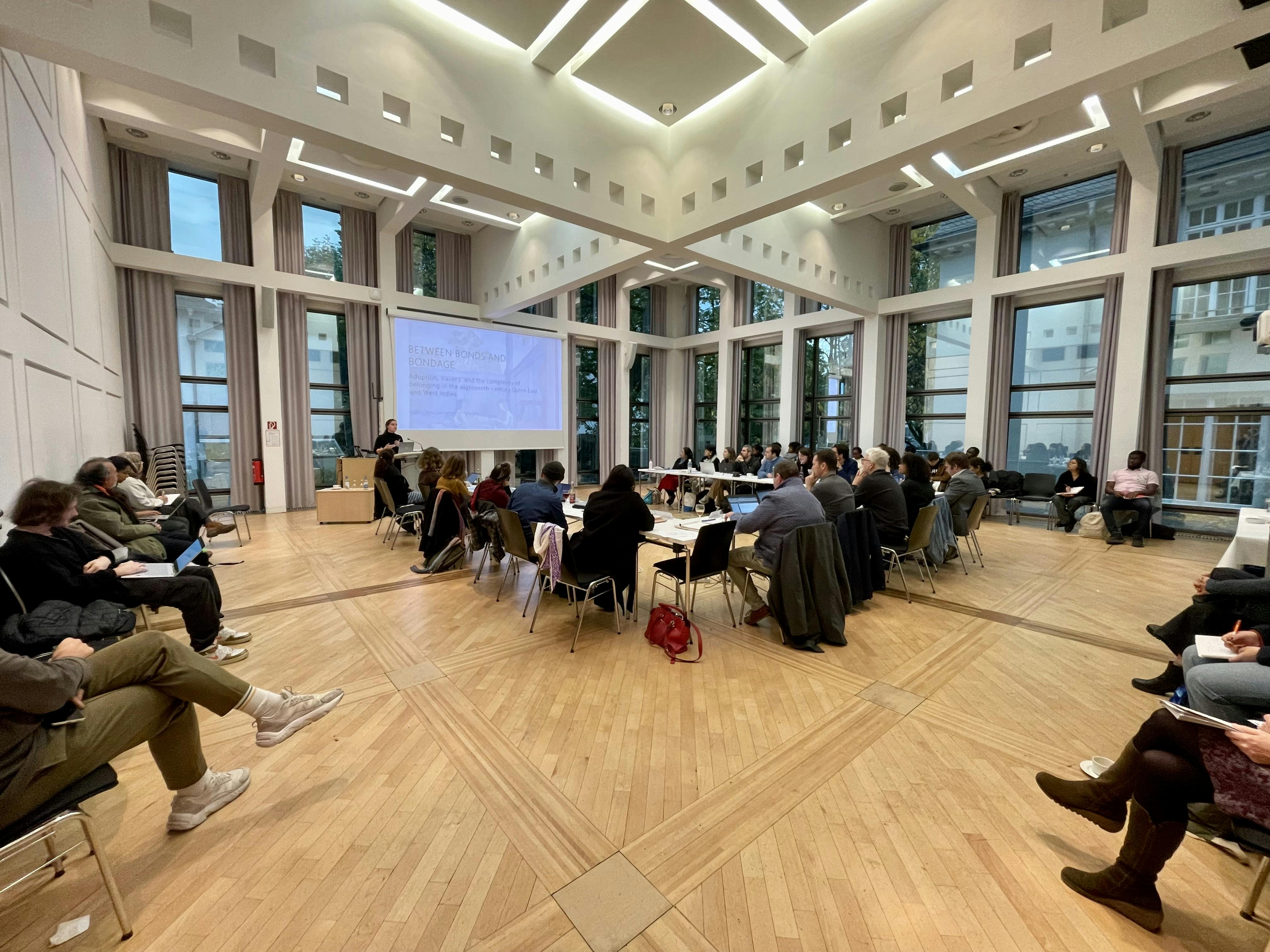
Guests from the BCDSS MA Programs in Dependency and Slavery Studies Attend as Sophie Rose Presents her Paper (photo by David Brandon Smith)
The second part of Panel IV was dedicated to a free-flowing discussion titled “How to Survive a PhD?” facilitated by Trevor Burnard, Stephan Conermann, and Damian Pargas. This session gave doctoral researchers a chance to ask questions, discuss problems, and share concerns with leading scholars in the field. The three professors and institutional leaders provided helpful and constructive feedback on questions and challenges raised by PhDs.
The fact that participants requested that even more space be set aside to discuss the challenges and possibilities of early-career research at next year’s seminar highlights the importance of naming and discussing the key challenges facing emerging scholars.
After a long day, we were ready to escape from the University Forum, where the conference was held. Once again, we went out into the city and made our way over to Schumann’s – a ‘go-to place’ for BCDSS conference dinners.
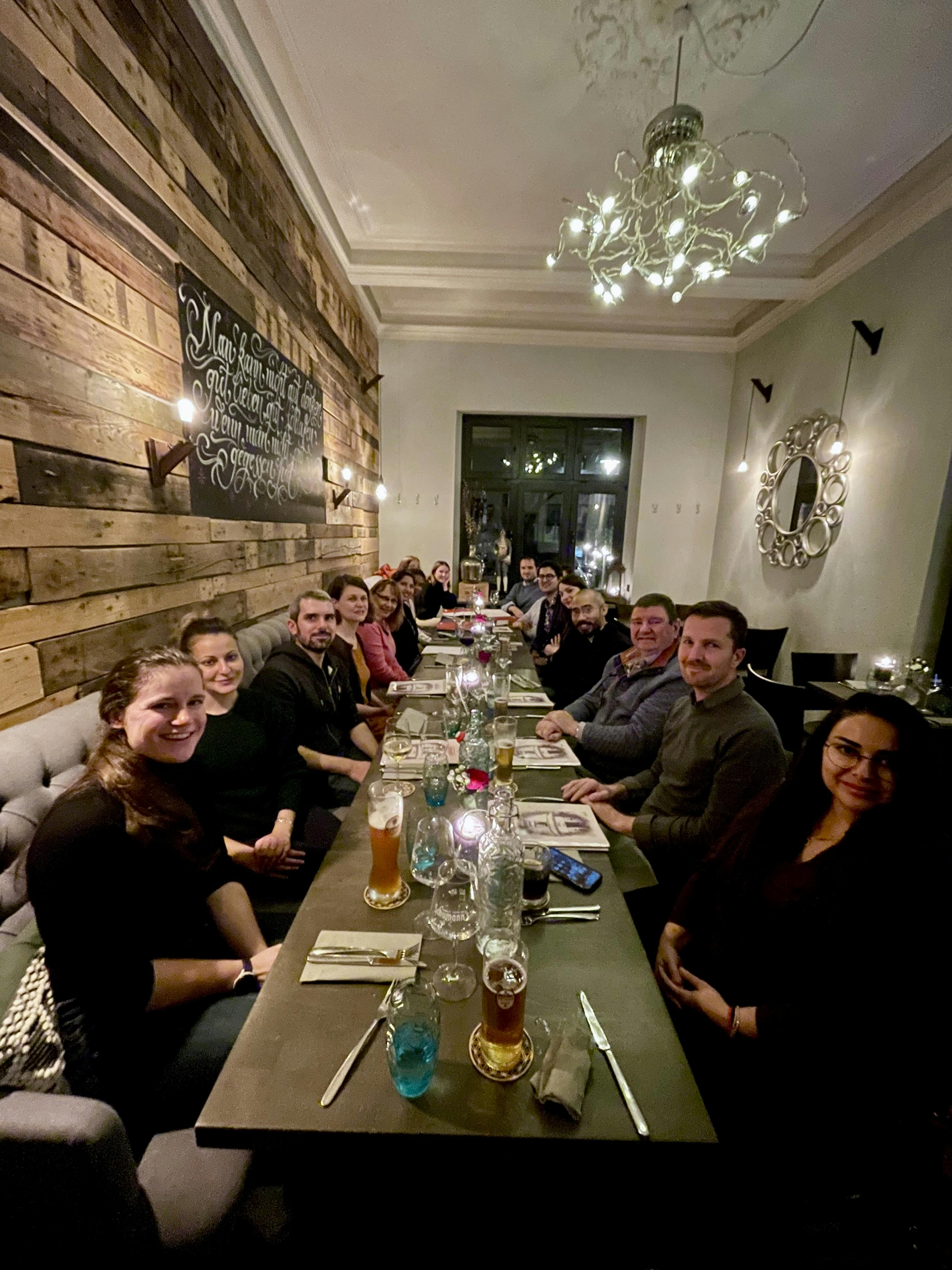
Conference Dinner at Schumann’s on Monday Evening (photo by David Brandon Smith)
The final day of the conference, Tuesday, 31 October, started off with a panel chaired by David Brandon Smith (BCDSS). After moving a few things around in the schedule, Turkana Allahverdiyeva (BCDSS) reached the lectern to present a paper titled “Unveiling Slave Struggles for Freedom: A Case Study of the Early Modern Crimean Khanate.” Turkana reported to the team she gained substantial insights from the discussion that followed her talk. Of her experiences, she wrote,
“The PhD seminar proved exceptionally valuable for me, particularly the insightful discussion with Trevor Burnard. He recommended that I remove the intersectionality approach from my research and concentrate on the asymmetrical dependency approach. This adjustment aligns more closely with my main argument and contributes significantly to the core of my research. I had been deliberating whether to emphasize intersectionality, and Prof. Burnard’s feedback confirmed my initial doubts and considerations. Moreover, the constructive feedback received from Damian Pargas and other PhD fellows not only affirmed my direction but also provided encouragement to progress confidently in my research. The collective input from my peers was both inspiring and motivating, creating a truly enriching academic atmosphere. Participating in this seminar was indeed a great experience that propelled my research in a more focused and purposeful direction” (Turkana Allahverdiyeva).
Turkana was followed by Martijn J. Stoutjesdijk (Protestant Theological University, NL). Martijn, who recently completed his doctoral dissertation, introduced his new postdoctoral project, which is part of the research group “Church and Slavery in the Dutch Empire: History, Theology and Heritage.” He then delivered a paper titled “Church Slavery in Dutch Colonial History: Some Explorations and Questions with Regard to Suriname.”
Following a coffee break, Trevor Burnard opened Panel VI as Eva Seutjens of the International Institute of Social History in Amsterdam, NL, presented a paper titled “Contesting the Transatlantic Slave Trade: Slave Revolts Aboard the Vigilantie and its Aftermath, 1780.” Christina Mocanu, former BCDSS fellow and PhD Researcher at Alexandru Ioan Cuza University, Iaşi, Romania, then presented her paper titled “Labouring Roma in the Salt Mine: Between One’s Own Choice and Punishment.” Viola Pacini (University of Bologna, Italy) then offered the last paper of the seminar titled “From the Highest to the Lowest: Dependency in Arabia Between the 19th and the 20th Centuries.”
After a wrap-up session led by Trevor Burnard, Stephan Conermann, and Damian Pargas, the seminar concluded with a book launch event at which over fifty people were in attendance.
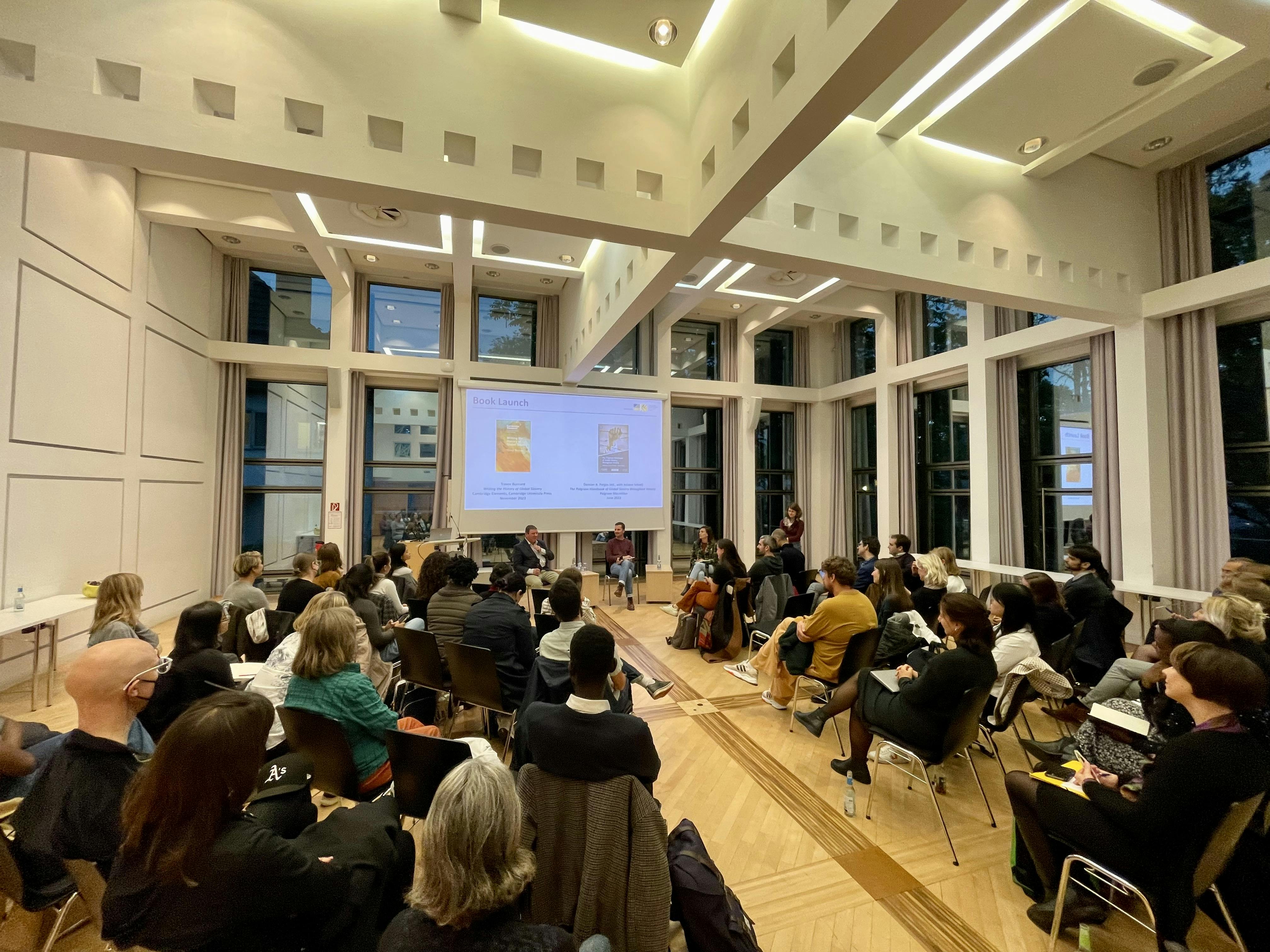
Invited Members and Guests of the BCDSS at the Book Launch (Photo by David Brandon Smith)
The book launch was moderated by postdoctoral researcher Viola Müller (BCDSS). It featured an author presentation by Trevor Burnard about his new book Writing the History of Global Slavery. Damian Pargas also presented the new Palgrave Handbook of Global Slavery Throughout History, which he co-edited with Juliane Schiel.
The Bonn/Leiden/Hull Seminar has now officially completed its third installment. Thus, it is safe to say that the event has become something of an annual tradition. As we look forward to the next seminar, which is set to be hosted in Leiden, we are mindful of the importance not only of interdisciplinarity but of international collaboration.
Indeed, case-based and comparative studies of slavery and dependency must be written communally, and the community of writers must represent a diverse array of disciplines, fields of inquiry, institutional affiliations, international cohorts, and cultural belongings.
Perhaps Nicholas C. Sy best summarized the kinds of provocative questions that can emerge when studies of slavery and dependency are written collaboratively and comparatively within a global academic community. In his evocative reflection on the seminar, he wrote,
“… over two days of sessions and meals, we engaged in continuous cross-pollination. Each paper seemed like the same puzzle with reconfigured rules. What if, rather than keeping people enslaved with the excuse of keeping them in a religion, missionaries instead refused to baptize the enslaved, afraid they would think themselves too similar to their masters? What if we looked at Crimean litigation rather than North American slave narratives for patterns of enslaved-and-mediator negotiation? I had to stop myself from over-advocating my approach to my new German friend. He laughed and said not to worry; these exchanges are exactly what the seminar is for” (Nicholas C. Sy).
If the study of slavery and dependency studies is to continue to break new ground even as it moves beyond the binary between slavery and freedom, its investigators must also continue to cross borders, epochs, and contexts. Through collaborative endeavors like the Bonn/Leiden/Hull Seminar, emerging scholars in these fields can build networks, boost their profiles, and, most importantly, interact with the rich diversity of the global academic community into which they have entered.

